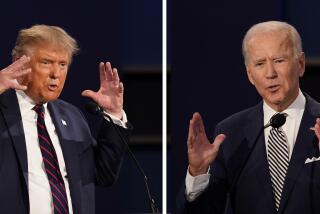In Living Color--Green
- Share via
If reason and logic do not move the U.S. Senate to have its sessions televised, intramural envy and pure partisan politics might. Consider the comments of Sen. Charles McC. Mathias Jr. (R-Md.), chairman of the Senate Rules Committee: “I see those little clips every night on the nightly news. Some House member is orating on something. Maybe it’s only for 10 seconds, but it’s part of the national dialogue, and we’re not part of it.”
House sessions have been carried in full since 1979 by C-Span, the excellent national cable-television public-affairs network. The major commercial networks routinely pick up portions of the debate from C-Span for illustration of their own stories on major House actions. The Senate has continued to resist, however, any recording or broadcasting of its deliberations. Newspaper reporters are not even allowed to take their own tape recorders into the Senate press gallery for note-taking purposes.
Former Senate Majority Leader Howard H. Baker Jr. (R-Tenn.) long was an outspoken advocate of televising the Senate’s sessions on C-Span. But his Democratic counterpart, Minority Leader Robert C. Byrd of West Virginia, was always opposed. Baker retired from the Senate this year without achieving his goal. But now Byrd has eased his opposition as he sees the Senate’s influence and prestige waning. Other senators are falling into line as they contemplate election challenges from home-state House members who routinely are seen on television news programs.
C-Span says that its latest poll shows that 62 senators favor televising the daily sessions. There still is formidable opposition. Some critics insist that senators might not be able to resist the temptation to grandstand on every bill as a means of getting television notice--a danger enhanced by the fact that the Senate does not have the House’s strict limits on debate.
It seems even more likely, however, that televising the Senate would improve the quality and discipline of Senate debates. After all, the succinct senator is more likely to get his clip on the network news than the rambler who has difficulty finding his point.
Mathias’ committee is considering the issue this week. Surely the Senate’s new sense of enlightenment, or at least self-interest, will inspire approval of opening the floor proceedings to the media of the 20th Century.
More to Read
Get the L.A. Times Politics newsletter
Deeply reported insights into legislation, politics and policy from Sacramento, Washington and beyond. In your inbox twice per week.
You may occasionally receive promotional content from the Los Angeles Times.










